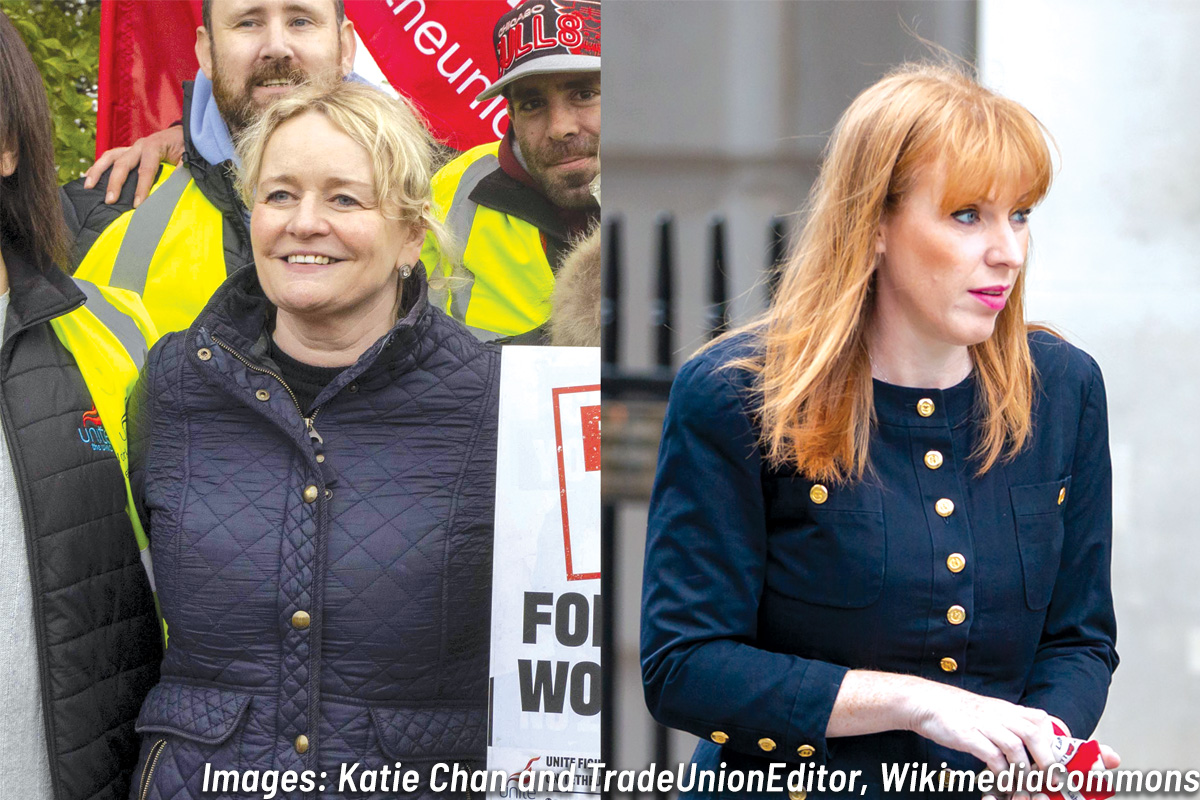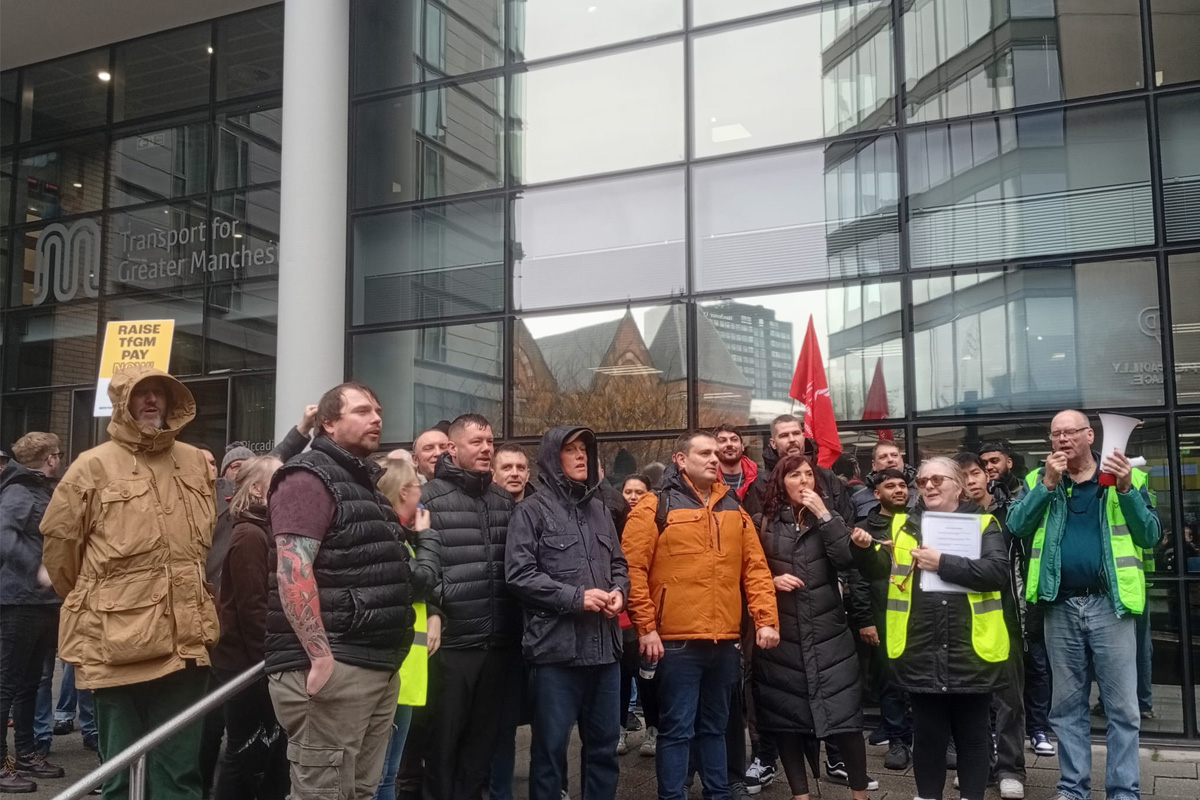On 11 July, Unite suspended Labour deputy leader Angela Rayner from the union, officially over her treatment of the Birmingham bin strikes.
The motion for her suspension, passed at Unite’s policy conference, garnered overwhelming support. Out of 800 delegates, only a handful voted against. The speech against the motion, meanwhile, received a cold response from the floor.
No wonder! This sly politician has the nerve to call herself a union member and constantly flaunt her ‘working-class credentials’. In reality, she’s been acting as scab-in-chief against a struggle being waged by members of her own union!
As secretary of state for local government, Rayner has stood by Birmingham council throughout this dispute.
The so-called ‘Labour’ council has spent over £1 million policing the strikes. They have banned hard picketing, employed scabs, and repeatedly lied about the strikes in the media.
And, as if that wasn’t enough to prove whose side Rayner is on, she has responded contemptuously to her suspension – calling it a “silly stunt”, and claiming that she had already quit the union, so as not to be “pushed around”.
How easily this careerist scumbag bites the hand that feeds her. It was Unite who donated £10,000 to her election campaign last year.
Voir cette publication sur Instagram
Opposition
Rayner’s suspension is a welcome and significant move, taking Unite further along the path of direct opposition to Starmer’s government.
Unite is the second largest union in the country, organising over one million workers across numerous different sectors, including local government.
The union could completely alter the British political landscape, if it wholeheartedly committed to taking a militant stance against Starmer’s Labour.
Following the vote on this emergency motion, Unite general secretary Sharon Graham came out with bold statements. “People up and down the country are asking whose side is the Labour government on,” Graham asserted, “and coming up with the answer: not workers.”
🚨 𝗨𝗡𝗜𝗧𝗘 𝗣𝗢𝗟𝗜𝗖𝗬 𝗖𝗢𝗡𝗙𝗘𝗥𝗘𝗡𝗖𝗘 𝗩𝗢𝗧𝗘 𝗧𝗢 𝗦𝗨𝗦𝗣𝗘𝗡𝗗 𝗔𝗡𝗚𝗘𝗟𝗔 𝗥𝗔𝗬𝗡𝗘𝗥 𝗙𝗥𝗢𝗠 𝗨𝗡𝗜𝗧𝗘 𝗠𝗘𝗠𝗕𝗘𝗥𝗦𝗛𝗜𝗣@unitetheunion is crystal clear it will call out bad employers regardless of the colour of their rosette. @AngelaRayner has had every… pic.twitter.com/iMa2XLp0IY
— Sharon Graham (@UniteSharon) July 11, 2025
Now words must turn into deeds. This means organising mass action against Starmer’s Labour and its anti-worker agenda.
Potential
The huge majority that this motion achieved – on the last day of conference – reflects the real mood on the ground.
Other motions tentatively criticised Labour. But none called for an open break with – and struggle against – Starmer.
Yet it was this motion, calling for the expulsion of the deputy leader of the Labour Party and her accomplices, that caused shockwaves.
In sharp contrast, the rest of the week’s proceedings were decidedly drab: dominated by motions about legal challenges, identity politics, and government lobbying.
This shows the latent potential that exists within the trade union movement. Workers are crying out for a real fightback against the government’s austerity and attacks. It is up to the union leaders to now give this a clear expression.
Struggle
The union is struggling to break out of its passive pre-Labour-government mentality.
Before last year’s election, the trade union leaders – including Graham – all appealed for members to “wait for Labour to come to power”.
“Once Labour’s in, we will be able to lobby for better conditions,” they assured.
🚨𝗚𝗼𝘃𝗲𝗿𝗻𝗺𝗲𝗻𝘁 𝗺𝘂𝘀𝘁 𝗱𝗲𝗹𝗶𝘃𝗲𝗿 𝗟𝗶𝗻𝗱𝘀𝗲𝘆 𝗼𝗶𝗹 𝗿𝗲𝗳𝗶𝗻𝗲𝗿𝘆 𝗰𝗲𝗿𝘁𝗮𝗶𝗻𝘁𝘆 ‘𝗶𝗻 𝗱𝗮𝘆𝘀 𝗻𝗼𝘁 𝘄𝗲𝗲𝗸𝘀’
Time is of the essence to ensure the future of the site is secured and workers are fully protected.
Ministers have taken steps to get… pic.twitter.com/ge3YmbDQy8
— Sharon Graham (@UniteSharon) July 16, 2025
But one year on, with Labour waging war on workers, the poor, and the vulnerable, it is clear that tepid appeals to Starmer and co. are not enough.
Instead, the trade union movement needs to take the path of open struggle.
First and foremost, this requires that the unions acknowledge the truth: that Starmer and Rayner are not on the side of the working class; and furthermore, that they are not anti-worker simply because they are misguided.
The Labour leaders are having to implement massive attacks against the working class because they are loyal servants of the capitalists – and the bosses, bankers, and billionaires are demanding that it is workers who must pay for capitalism’s crises.
To win genuine gains for workers will require more than kind appeals or smart negotiations, therefore. What is needed is militant mass struggle, in pursuit of bold socialist policies.
Unity
Unfortunately, Unite’s leadership does not see things in this way. Instead, they sow illusions that capitalism can be fixed to the benefit of workers.
Flowing from this, the union’s leaders have a parochial, blinkered outlook. Instead of uniting workers across different industries to fight for the broader interests of the working class as a whole, they see everything in terms of narrow, sectoral interests.
To defend jobs in the ‘defence’ industry, for instance, the leadership has consistently tied itself to British imperialism: supporting the Ukraine war; taking an equivocal stance on Palestine; and supporting the government’s militarism.
Workers at @BAESystemsplc and across the whole UK defence and manufacturing industry will be looking at the ending of the Typhoon final assembly production at Warton and asking how a @GOVUK promising to turn defence spending into ‘British growth, British jobs, British skills,… pic.twitter.com/97JuO6NFCX
— Sharon Graham (@UniteSharon) July 7, 2025
Under capitalism, this strategy simply means pitting one section of workers against the rest. Money spent on bombs and bullets is money taken away from public services and social spending. In the end, workers across the board all lose.
Instead, the union leaders should be mobilising workers – both in the defence industry and across the economy – against the Starmer government, and against the imperialist war machine.
Such a struggle should be fought in demand of socialist planning and workers’ control: retooling factories; reskilling workers; and cutting the working week, with no loss of pay – all under a democratic economic plan, in which workers themselves could run production to meet the needs of society, not the interests of the imperialists and capitalists.
The union leaders have no belief that such a programme could actually be realised, however, nor in the ability of workers to transform society along socialist lines.
This is why they end up making concessions to capitalism and imperialism. And it is precisely this weakness that needs to be overcome for Unite – and the other unions – to advance the interests of ordinary workers everywhere.
Voir cette publication sur Instagram
Programme
With Angela Rayner’s suspension from the union, questions are being asked about whether Unite will disaffiliate from Labour and back a new workers’ party.
The aforementioned motion leaves this question hanging, committing the union to “discuss [Unite’s] relationship with Labour”. Yet it is being posed even more sharply by suggestions that Jeremy Corbyn and Zarah Sultana may soon launch a new left party.
If unions like Unite were to throw their weight behind a Corbyn-led party, this would undoubtedly give it a massive, welcome boost.
But any break with Labour must not be seen primarily in organisational terms. Above all, such a move must be political.
If the unions are going to take the leap of establishing a new party, then this should be on the basis of forging a political vehicle for workers’ class interests, as an auxiliary to militant industrial struggle.
This means fighting – both on the political plane, and in workplaces and on the streets – for a socialist programme that is firmly anti-imperialist and anti-austerity.
Escalation
To her credit, since Graham was elected leader in 2021, disputes, strikes, and victories have multiplied across Unite. Rank-and-file members have experienced for themselves that militancy pays.
Unfortunately, however, these disputes have generally remained isolated from one another.
Take the example of the Birmingham bin strikes. This has been an all-out, indefinite struggle, lasting months. But the refuse workers, organised in Unite, are now at a crossroads – confronted with the force of the law, via a ban on hard-picketing.
The only way to advance is to break through these laws and escalate the struggle beyond the Birmingham bin workers themselves.
The Unite leaders have the means to do this. There is already a struggle at Veolia in Sheffield, for example, which Birmingham bin workers have joined up with and offered solidarity to.
Unite also organises bin workers in many other councils, alongside many other public sector workers. All of these workers could be actively brought out together, in order to broaden the fight to one against the government and Starmer’s austerity in general.
Voir cette publication sur Instagram
Alternative
In this way, Unite could kickstart an open challenge to Starmer’s government: for the repeal of all the anti-union laws; for the reversal of cuts, privatisation, and outsourcing in councils across the country; for a real living wage and decent working conditions; and to make the billionaires pay for all of these demands.
Such a campaign could energise the ranks of other unions, to whom Unite could appeal for mass coordinated action.
This is the kind of boldness required to win over millions of workers and young people, and provide a real, fighting, class alternative to Starmer’s Labour and its rotten capitalist policies.






